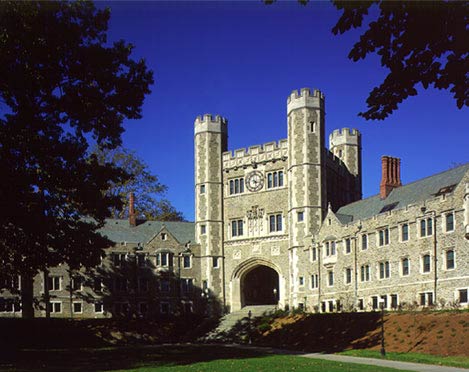Princeton University Panel Explores Hindu-Christian Violence
By ISKCON News Weekly Staff | Nov 22, 2008

Princeton, NJ – A lively panel of experts on religious freedom convened at the prestigious Princeton University on November 10 to explore the roots and ramifications of Hindu-Christian violence in India.
The discussion, titled “Faiths on Fire”, was hosted by Princeton’s new Hindu Life Program and co-sponsored by a number of academic departments and programs. The discussion was planned to address the recent escalation in Hindu-Christian violence in Orissa, following the murder of local Hindu religious leader Swami Lakhmanananda Saraswati.
Although it is disputed who is responsible for the brutal slaying of the Swami – who was known for his strong opposition to Christian conversions – the killing sparked a wave of anti-Christian violence in the region, including the burning of homes and churches.
“No side is left blameless in this conflict. After the initial attacks on church institutions and the shops and homes of Christian families, Christian mobs responded in kind,” reported BBC News anchor Dan Isaacs.
“All share some responsibility for what has happened, all have suffered. Years of relatively peaceful co-existence of these communities, living a fragile rural existence, has been shattered.”
The discussion at Princeton focused on exploring the violence in a social, religious, and anthropological context. Featured speakers included Angela C. Wu, legal director of the Becket Fund for Religious Liberty, Bridget Kustin, a communications specialist for the U.S. Commission on International Religious Freedom, and Dr. Jeffery D. Long, chair of the Religions Department at Elizabethtown College.
Ms. Wu and Ms. Kustin described their work in the field, particularly in Orissa, and shed light on the underlying economic and tribal tensions between Hindus and Christians in the region. Dr. Long took this a step further, arguing that differences between the two communities have perhaps more to do with tribal affiliation and identity than with theological or religious differences. Dr. Long also raised the question of what role forced or induced conversion – a big concern to Hindu leaders in India right now – play in contributing to the tensions.
While the panelists demonstrated a diversity of viewpoints and perspectives on particular issues, all agreed that Hindu-Christian violence is complex and multi-faceted, and warned against over-simplification or vilifying one tradition or the other.
The panel discussion was moderated by Princeton’s Hindu Life Coordinator, Vineet Chander—known to fellow ISKCON members by his initiated name, Venkata Bhatta Dasa. In addition to his work at Princeton, Vineet serves as a communications director in ISKCON and is an editorial advisor to ISKCON Newsweekly.
“We are perhaps left with more questions than answers, with more recognition of the gray areas and complexity,” Vineet told the audience at the conclusion of the discussion, adding that he thought the lack of a neat and tidy ending signified a healthy approach to the problem.
Vineet hopes to pursue the underlying causes of Hindu-Christian tensions – especially issues surrounding conversion and proselytization – by hosting a more in-depth symposium on the topic at Princeton in the Spring.
“I think ISKCON devotees can contribute to that discussion,” he said. “As a Hindu movement that actively welcomes non-Hindus into the fold, ISKCON may have a unique perspective to share on issues of conversion in the Indian context.”















